#sba tax consultants
Explore tagged Tumblr posts
Text


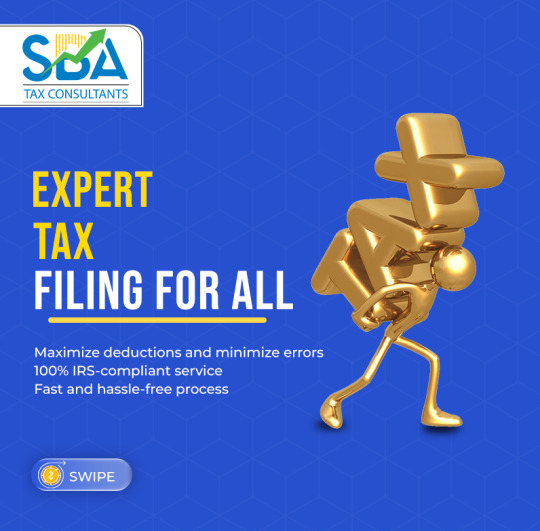
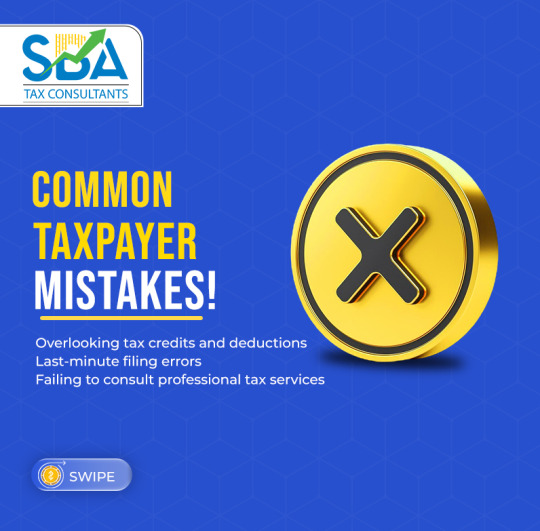
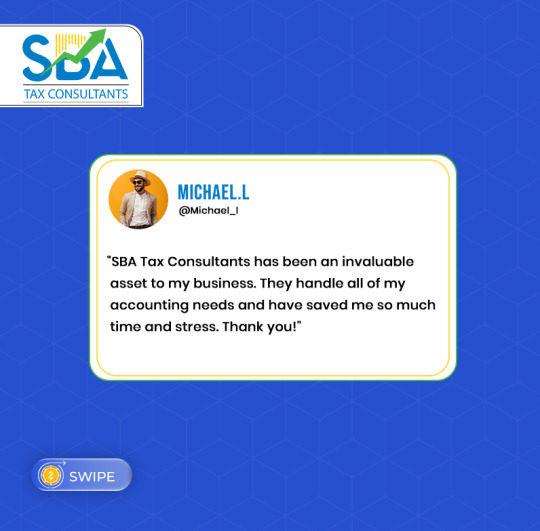

October 15th Tax Filing Deadline
Don't miss the final opportunity to file your taxes. Our team at SBA Tax Consultants is here to help you avoid penalties and ensure you maximize your savings. Whether it's personal or business taxes, we've got you covered! Visit us at: 8500 N Stemmons Fwy, Dallas, Texas 75247 Call: +1 469 722 5480 Email: [email protected] Learn more: sbataxconsultants.com
#sba tax consultants#tax consultants#tax services#tax filing#companies#taxiservice#taxes#financial#gst#deadline#usa news
0 notes
Text
Top 5 Mistakes to Avoid When Applying for an SBA Loan and How Loan Facilitators Can Help You Avoid these Pitfalls

Applying for a Small Business Administration (SBA) loan can be an excellent way to fund your business, but it’s not without its challenges. Even small mistakes during the application process can derail your efforts, causing delays or outright rejection. By understanding common pitfalls, one can streamline the application and improve the chances of securing the funds a business need.
Mistake #1: Poor Preparation of Financial Documents
One of the most common mistakes applicants make is submitting incomplete or poorly prepared financial documents. SBA loans require detailed records, including profit and loss statements, balance sheets, cash flow projections, and tax returns. Without accurate and comprehensive financial documentation, lenders can’t assess the financial health of your business. Applicants must take the time to get financials in order before applying. If necessary, consult a professional accountant to ensure everything is up-to-date, well-organized, and clearly reflects your business’s performance.
Mistake #2: Not Choosing the Right SBA Loan for the Business Needs
There are various types of SBA loans, each designed for specific purposes. Whether you’re looking for a loan to start a business, expand your current operations, or purchase equipment, choosing the wrong type of loan can hurt your chances of approval. Familiarize yourself with the different SBA loan programs, such as the 7(a) loan, 504 loan, and microloans. Make sure you understand which loan best suits your business’s needs and consult with a knowledgeable advisor if necessary.
Mistake #3: Failing to Demonstrate Business Viability
Lenders want assurance that the business can generate enough revenue to repay the loan. Failing to prove business’s viability is a major red flag. This mistake often stems from not having a clear business plan, incomplete market research, or unrealistic financial projections. Develop a solid business plan that clearly outlines your strategy, market position, and financial projections. Use data to back up your claims and show lenders how you plan to succeed and grow.
Mistake #4: Ignoring Credit Score Requirements
Your personal and business credit scores play a crucial role in the loan application. Ignoring credit score requirements, or assuming they don’t matter, can lead to a rejected application. While SBA loans are known for being more flexible than traditional loans, lenders still evaluate your creditworthiness. Having a credit score of 680 or higher can boost the strength of your application. Check your credit score before applying. If your score isn’t where it needs to be, take time to improve it by reducing debt, paying off outstanding balances, or correcting any errors on your credit report.
Mistake #5: Incomplete or Inaccurate Application Forms
Filling out the SBA loan application requires attention to detail. Incomplete, inaccurate, or inconsistent information can slow down the process or lead to an outright rejection. Many applicants underestimate how meticulous the application process can be. Double-check all your forms for accuracy and completeness. Provide consistent information across all documents. If you’re unsure about any part of the application, seek assistance from professionals who has experience with SBA loans.
How SBA Loans Online Help You Avoid These Pitfalls
Navigating the complexities of an SBA loan application can be overwhelming, but with the right support, you can avoid these common mistakes. Our team of experts will:
Review and prepare your financial documents to ensure accuracy and completeness.
Help you select the right SBA loan program based on your business needs and goals.
Assist you in developing a strong business plan that demonstrates your business’s viability.
Provide guidance on improving your credit score before applying.
Carefully review your application for accuracy and completeness to minimize the risk of rejection.
By working with us, you’ll have a trusted partner in your corner, helping you avoid these pitfalls and ensuring your application is as strong as possible.
SBA Loans Online is promoted by Robinson & Associates LLC, a reputable financial firm with over 15 years of experience. The company specializes in various SBA loan programs, including 7(a) loans, CDC/504 loans, and microloans. They also offer industry-specific services such as franchisee loans, equipment loans, start-up loans, and working capital loans under $500K. Their experienced loan specialists provide comprehensive guidance and support, ensuring accurate documentation and meticulous attention to detail throughout the loan process. SBA Loans Online aims to secure the essential capital for business expansion by offering expert advice and assistance with all necessary paperwork.
Contact us: https://www.sbaloansonline.com/contact-us.php
0 notes
Text
9 Things to Know Before Starting a Laundry Service

The laundry industry is booming, with projections indicating it will reach $110 billion market size by 2025. Due to the convenience, the demand has only increased as more people turn to clothing cleaning services. Entrepreneurs who realize this trend may look for starting a laundry business as it can be a profitable opportunity. With few added things that can assist you in making limb us love ful of your laundry service and help you to take the plunge into the laundry service world.
The beginning of the laundry business with growth is the best way to develop a Laundry service mobile app to provide multiple services in one frame. Multiple users can reach at laundry services via Mobile App and can order staying in their home.
Understanding the Laundry Business Landscape
Market Research and Analysis
Before launching, it’s crucial to understand the laundry market. It includes various segments such as residential, commercial, and industrial cleaning services. Research shows that younger generations prefer convenience, driving up demand for services like wash-and-fold and pickup/delivery. Resources like IBISWorld and Statista provide valuable insights into market size and competition.
Types of Laundry Services
Different business models cater to diverse customer needs. Here are a few popular ones:
• Pickup and Delivery: Offers customers ultimate convenience. Businesses like Rinse and Hamper are successful in big cities.
• Self-Service Laundromats: Great for budget-conscious customers who prefer doing laundry themselves.
• Wash-and-Fold: Ideal for busy individuals looking for time savings.
Each model has its own appeal and can be tailored to fit your target market. Consider what unmet needs exist in your area and how your service can fill that gap.
Competitive Analysis
Evaluate your competition carefully. Identify their strengths, weaknesses, and unique selling propositions (USPs). Analyze pricing strategies and marketing tactics to uncover gaps in the market. For example, if competitors focus solely on price, you could position your service with superior quality or additional conveniences, like eco-friendly products.
Financial Planning and Investment
Startup Costs Startup costs vary widely but typically include:
• Equipment: Commercial washers and dryers can cost several thousand dollars.
• Licenses and Permits: Costs depend on local regulations.
• Marketing: Initial branding and advertising can range from $500 to over $5,000. A detailed budget helps you anticipate expenses and avoid surprises.
Funding Options Explore multiple funding sources to finance your business, such as:
• Small Business Loans: Traditional banks and online lenders operate backed by the Small Business Administration (SBA).
• Grants: Look for local programs supporting small businesses.
• Crowdfunding: Platforms like Kickstarter or GoFundMe can help drum up initial investment.
Pricing Strategy
Setting prices isn’t just about covering costs. Research what competitors charge for similar services in your area. Consider offering tiered pricing to attract different customer segments while ensuring profitability.
Legal and Regulatory Compliance
Business Licenses and Permits
Depending on your location, you may need specific licenses and permits. For example, in California, a laundry business might require a business license, a seller’s permit, and a health permit. Always check local regulations to avoid fines. Don’t forget to review environmental regulations, especially concerning wastewater management.
Insurance Requirements
Insurance protects your investment. Key types include:
• General Liability Insurance: Covers accidents and damage claims.
• Property Insurance: Protects your equipment and facility.
• Worker's Compensation: Required if you have employees.
Tax Obligations
Understand your tax responsibilities, including sales tax for services and income tax for profits. Consult with a tax professional to ensure compliance.
Operations and Logistics
Equipment Selection
Choose equipment based on capacity, efficiency, and reliability. Consider energy-efficient machines to save on costs long-term. Brands like Maytag and Speed Queen are popular for their durability and performance.
Laundry Process and Workflow
Create an efficient workflow to streamline your operations. Typical steps include:
1. Pickup: Collect laundry from customers.
2. Sorting: Separate items based on fabric type and color.
3. Washing: Use appropriate cycles and products.
4. Drying: Ensure items are dried thoroughly.
5. Folding: Neatly organize clothes for delivery.
Technology and Software
Incorporate laundry management software to simplify operations. Programs like CleanCloud and LaundroBlast help with scheduling, tracking, and payment processing.
Marketing and Customer Acquisition
Branding and Messaging Develop a strong brand identity that resonates with your target audience. A memorable name and logo create lasting impressions, making it easier to attract customers.
Online Marketing Strategies
Leverage online platforms for visibility. Consider:
• Search Engine Optimization (SEO): Optimize your website to rank higher in search results.
• Social Media Marketing: Engage with customers on platforms like Facebook and Instagram.
• Local Search Optimization: Ensure your business appears in local searches through Google My Business.
Successful campaigns often result from targeted messaging and active customer interaction. Highlight customer testimonials and reviews to build trust and credibility.
Customer Relationship Management (CRM)
Build strong relationships with customers. Offer loyalty programs, send personalized communications, and respond to feedback promptly. Happy customers are your best marketers.
Risk Management and Contingency Planning
Equipment Malfunctions Prevent breakdowns with regular maintenance schedules. Keep spare parts on hand to minimize downtime.
Unexpected Expenses
Establish a financial buffer to cover unforeseen costs. This can prevent cash flow issues when emergencies arise.
Conclusion
Laundry app has served people in managing their dark household tasks like washing clothes. This the reason why further people are preferring the online laundry services to save themselves from this extra cleaning burden.
Various laundry start up is opening the market field and improving the laundry services. This is performed by applying different useful business strategies that ensure maintaining the customer’s reliability and comfort.
Without providing a second opinion, create your laundry app today by connecting with our developers. At Deorwine Infotech, hire dedicated mobile app developers make sure that you get the best laundry apps.
For laundry services are a valuable investment that you are going to make. Therefore, without any pause, get your laundry app development solution by our expert developers.
For more info visit us: https://deorwine.com/blog/things-to-know-before-starting-a-laundry-service/
Contact Us:
Website: https://deorwine.com
Email id: [email protected]
Skype: deorwineinfotech
For Any Query Call Us at: 91-9116115717
#laundry app development cost#laundry app development#on demand laundry app development#laundry app development company#laundry app feature#mobile app development company
0 notes
Text
Guide to Securing Large Balance Commercial Loans
Securing a large balance commercial loan is a crucial step for businesses aiming to expand, invest in new projects, or manage operational costs. However, obtaining such loans can be complex and requires careful preparation. This guide outlines the essential steps and considerations to help you navigate the process successfully.
1. Understand Your Business Needs
Before approaching lenders, it's important to have a clear understanding of why you need the loan and how you plan to use the funds. Common purposes for Large balance Real Estate Investment loans include:
Expanding operations
Purchasing commercial real estate
Acquiring new equipment or technology
Refinancing existing debt
Create a detailed plan outlining your business goals, the amount of funding required, and how the loan will contribute to achieving those goals. This will help you present a compelling case to potential lenders.
2. Assess Your Financial Position
Lenders evaluate your business’s financial health to determine its ability to repay the loan. Key factors they consider include:
Creditworthiness: Review your business and personal credit scores. A strong credit history increases your chances of approval and can lead to better terms.
Revenue and Profitability: Demonstrate consistent revenue streams and a solid profit margin. Lenders want assurance that your business generates enough income to cover loan repayments.
Debt-to-Income Ratio: Maintain a healthy balance between your income and existing debts. High debt levels can make lenders hesitant to approve your application.
Ensure your financial records are accurate and up-to-date. Preparing audited financial statements, tax returns, and cash flow projections can strengthen your application.
3. Research Loan Options
Large balance commercial loans come in various forms, each with its unique terms and conditions. Common options include:
Term Loans: Fixed repayment schedules over a set period, often used for significant investments.
Lines of Credit: Flexible funding that allows you to borrow as needed, ideal for managing cash flow.
SBA Loans: Government-backed loans with favorable terms, suitable for small to medium-sized businesses.
Evaluate each option based on your business needs, repayment capacity, and long-term goals. Comparing interest rates, fees, and repayment terms will help you select the best loan type.
4. Prepare a Comprehensive Loan Application
A well-prepared loan application increases your chances of approval. Include the following elements:
Business Plan: A detailed description of your business, market analysis, growth strategy, and how the loan will be utilized.
Financial Documentation: Income statements, balance sheets, cash flow projections, and recent tax returns.
Collateral Details: Information about assets you can pledge as security for the loan.
Personal Information: For small businesses, lenders may request personal financial details of the owners.
Presenting a thorough and organized application demonstrates professionalism and builds lender confidence.
5. Build Relationships with Lenders
Establishing a strong relationship with potential lenders can significantly impact your Construction Loans Nationwide application. Meet with loan officers to discuss your business’s needs and address any concerns they may have. Be prepared to answer questions about your business operations, financial performance, and future plans.
Consider working with financial advisors or consultants who can introduce you to reputable lenders and guide you through the application process. A solid network can open doors to better loan opportunities.
6. Negotiate Loan Terms
Once you receive loan offers, carefully review the terms and conditions. Pay close attention to:
Interest Rates: Compare fixed and variable rates to determine which aligns with your financial strategy.
Loan Tenure: Assess repayment periods and their impact on monthly payments.
Fees: Account for origination fees, prepayment penalties, and other charges.
Don’t hesitate to negotiate with lenders to secure favorable terms. Demonstrating your business’s financial stability and growth potential can give you leverage in negotiations.
7. Plan for Repayment
Creating a repayment plan is essential to ensure timely payments and maintain a good relationship with your lender. Consider the following:
Budgeting: Allocate a portion of your revenue for loan repayments.
Monitoring Cash Flow: Regularly review your cash flow to identify potential repayment challenges.
Contingency Planning: Prepare for unforeseen circumstances by maintaining an emergency fund.
Staying on top of your repayments not only avoids penalties but also improves your credit profile, making it easier to secure future financing.
8. Understand Legal and Regulatory Requirements
Large balance commercial loans often come with complex legal and regulatory obligations. Work with legal and financial experts to review loan agreements, ensuring you understand all terms and comply with relevant laws.
Some key considerations include:
Loan Covenants: Conditions set by the lender, such as maintaining specific financial ratios.
Documentation Compliance: Ensuring all documents are accurate and meet regulatory standards.
Tax Implications: Understanding how the loan impacts your business’s tax obligations.
9. Monitor and Evaluate Loan Performance
Once the loan is in place, track its performance and impact on your business. Regular evaluations help you:
Measure ROI: Assess whether the loan is achieving its intended purpose.
Identify Challenges: Address repayment or financial management issues promptly.
Plan for Future Financing: Use insights to improve future loan applications and strategies.
Conclusion
Securing a large balance commercial loans requires careful planning, thorough research, and diligent execution. By understanding your business needs, preparing a strong application, and building relationships with lenders, you can enhance your chances of approval and set your business up for long-term success. Remember, professional guidance from financial and legal experts can provide valuable support throughout the process, ensuring you make informed decisions that align with your goals.

0 notes
Text
Top Tax Planning Strategies for Small Businesses
Effective tax planning is crucial for small businesses aiming to boost profits and minimize tax burdens. Here are key strategies, with insights from Lodestar Taxes.
1. Choose the Right Business Structure
Your business type—sole proprietorship, LLC, S corporation, or corporation—affects taxes. Each has unique benefits and implications. Tip: Consult with a tax expert to ensure your structure is tax-efficient. Learn more.
2. Keep Detailed Financial Records
Accurate records help claim deductions and avoid errors. Use software like QuickBooks. Tip: For streamlined preparation, consider Lodestar’s tax services.
3. Maximize Deductions
Track and claim all eligible expenses, such as office costs, employee benefits, and travel. Tip: Review deductions frequently to optimize savings.
4. Utilize Tax Credits
Credits like the Work Opportunity and R&D credits can lower taxes directly. Tip: Stay updated on new credits, and leverage every opportunity.
5. Invest in Retirement Plans
Options like SEP IRAs and 401(k)s offer tax advantages. Tip: Choose a plan that aligns with your financial goals for maximum benefit.
6. Defer Income
Deferring income to the next tax year can reduce your current tax liability. Tip: Evaluate your cash flow to see if deferral makes sense.
7. Pick the Right Accounting Method
Decide between cash and accrual accounting to match your business needs. Tip: Seek professional advice to select the most beneficial method.
8. Use Net Operating Losses (NOLs)
Offset losses against future or past income to reduce tax liability. Tip: A tax professional can help you apply NOLs strategically.
9. Hire a Tax Professional
Navigating tax laws is challenging. An experienced advisor ensures compliance and maximizes savings. Tip: Lodestar’s team offers personalized tax solutions.
10. Regularly Update Your Strategy
Tax regulations evolve. What worked before may not work now. Tip: Schedule yearly reviews with your tax advisor to stay on top of changes.
Conclusion
Smart tax planning is vital for business success. By understanding your structure, maximizing deductions, and seeking expert advice, you can significantly reduce your tax burden. For personalized assistance, partner with Lodestar Taxes to make informed and strategic tax decisions.
Additional Resources:
IRS Small Business Tax Center
SBA - Tax Planning Guidance
Implement these strategies to keep your business tax-efficient and financially strong.
0 notes
Text
youtube
How To Maximize Your Business Sale Price (Expert Tips) https://www.youtube.com/watch?v=dW-TBudHNg0 Join us for an insightful conversation with Scott Hyde, How To Maximize Your Business Sale Price (Expert Tips). as a seasoned business broker from Portland, Oregon. In this episode, Scott shares his extensive experience and tips on the process of selling small 'Main Street' businesses, covering everything from valuations and marketing to the nuances of SBA loans and transitional training. Learn how to prepare your business for sale, set competitive values, and navigate the complex emotions involved in passing on your legacy. Perfect for business owners looking to smoothly transition and achieve the best possible outcome in their business sale journey. 00:00 Introduction to Business Transition 00:17 Meet Scott Hyde: Business Broker 01:30 Understanding the Seller's Perspective 02:11 Evaluating a Business for Sale 03:42 Setting a Competitive Valuation 07:57 Marketing and Attracting Buyers 10:59 Navigating SBA Loans and Owner Financing 15:02 The Importance of Transitional Training 20:45 Building Value for a Successful Exit 25:00 The Importance of Early Tax Planning 26:00 The Consequences of Poor Planning 26:38 Real-Life Examples of Tax Planning Failures 28:38 Understanding Your Audience and Financials 30:11 The Role of Transparency in Business Sales Connect with Scott Hite: SCOTT A. HITE, JD, MA | Business Broker/Advisor/Attorney Oregon Licensed Principal Broker: #201218627 https://ift.tt/pleZazo | [email protected] Phone: 503.953.3999 Businesses For Sale in Portland | Businesses For Sale in Oregon Stay Connected: 👉 Facebook: https://ift.tt/p3Xlqwy... 👉 Twitter (X): https://x.com/AnvilTax 👉 LinkedIn: / daveedtuck 👉 Website: https://ift.tt/AS6EwMm 👉 Blog: https://ift.tt/3Rx0JI9 📩 For Business Inquiries: [email protected] 🎬 Recommended Playlists 👉 Tax Planning Insights with Daveed Tuck https://www.youtube.com/playlist?list=PLPNQ5Z_646DO8_79h1DovpYC8HYUJnOLX 👉 Avoiding The Biggest Tax Mistakes Playlist https://www.youtube.com/playlist?list=PLPNQ5Z_646DObYKvEGg-Rdz-zo18I3vvn 🎬 WATCH MY OTHER VIDEOS: 👉 Surprising Tax Deductions Even Criminals Can Use: IRS Tax Loopholes - Portland Tax Tips https://www.youtube.com/watch?v=5kNelL0AvAk 👉 Top NFL Players' Secret Tax Strategies: Portland Business Tax Tips https://www.youtube.com/watch?v=tpX0MqjDU0w 👉Secrets The Wealthy Use To Save Millions: Real Estate Tax Consultant Portland https://www.youtube.com/watch?v=iWEh4gpAmII 👉Why Switching Payroll In Q4 Saves You Time And Money? https://www.youtube.com/watch?v=5LhISn-tVGE ⚠️ Disclaimer: I do not accept any liability for any loss or damage incurred from you acting or not acting as a result of watching any of my publications. You acknowledge that you use the information I provide at your own risk. Do your research. ✖️ Copyright Notice: This video and my YouTube channel contain dialogue, music, and images that are the property of Anvil Tax, Inc. You are authorized to share the video link and channel and embed this video in your website or others as long as a link back to my YouTube channel is provided. © Anvil Tax, Inc. ✨LTC 31902-C via Anvil Tax, Inc. https://www.youtube.com/channel/UCUoFv7UTag1d1H9RoZ5wqmw November 10, 2024 at 01:50AM
#retirementtaxstrategies#avoidingtaxmistakes#wealthmanagement#estateplanning#portlandtaxconsultant#oregontaxplanning#taxpreparationportland#Youtube
0 notes
Text
How to Become a Business Owner: A Step-by-Step Guide

Becoming a business owner is an exciting and rewarding journey, but it’s not without challenges. Whether you're driven by the desire for financial independence, want to follow a passion, or simply seek the freedom of being your own boss, entrepreneurship is an appealing path. However, it's important to approach business ownership with the right mindset, preparation, and strategy. In this blog, we will guide you through the essential steps to becoming a successful business owner.
Step 1: Identify Your Business Idea
The first step to becoming a business owner is finding the right business idea. Start by identifying your passions, strengths, and skills. Consider gaps in the market, trends, or problems you can solve. Here are some ways to generate business ideas:
Solve a problem: Think about common pain points people experience and how you can address them with a product or service.
Follow your passion: If you have a hobby or interest, explore ways to turn it into a business.
Evaluate trends: Look at emerging trends and industries, such as technology, sustainability, or wellness, to find opportunities.
Once you have a list of potential ideas, conduct market research to evaluate demand, competition, and profitability.
Step 2: Create a Business Plan
A solid business plan is essential to the success of your venture. This document outlines your business goals, target market, financial projections, and operational strategies. A well-thought-out business plan can also help you secure financing and serve as a roadmap for your growth. Key elements of a business plan include:
Executive summary: A brief overview of your business and its goals.
Market analysis: Research on your target market, industry trends, and competitors.
Marketing strategy: How you plan to attract and retain customers.
Financial plan: Revenue projections, funding requirements, and profitability forecasts.
Step 3: Choose Your Business Structure
Your business structure determines your legal responsibilities, taxes, and personal liability. The most common business structures include:
Sole proprietorship: The simplest form, where you own and run the business on your own.
Partnership: A business owned by two or more people sharing responsibility and profits.
Limited Liability Company (LLC): Offers protection against personal liability while providing operational flexibility.
Corporation: A more complex structure offering limited liability but requiring more regulatory compliance.
Choosing the right structure depends on factors such as liability, taxes, and the type of business you plan to run. Consult a legal or financial advisor to help you make the best decision.
Step 4: Register Your Business
Once you've chosen a structure, you'll need to register your business with the relevant authorities. This may include obtaining a business name, securing licenses or permits, and registering for taxes. Common registration steps include:
Registering your business name: Depending on your location, you may need to file a "Doing Business As" (DBA) name if it differs from your legal name.
Obtaining business licenses: Check with local, state, or federal agencies to determine what licenses or permits are required for your industry.
Tax registration: Apply for an Employer Identification Number (EIN) if needed, and understand your tax obligations.
Step 5: Secure Funding
Most businesses require some form of startup capital. Depending on the size and nature of your business, you may need to explore various financing options, such as:
Personal savings: Using your own money is a common way to fund your business.
Business loans: Apply for a loan through a bank or Small Business Administration (SBA).
Investors: Look for venture capital or angel investors interested in your idea.
Crowdfunding: Platforms like Kickstarter or GoFundMe can help raise funds for your business.
Grants: Depending on your industry, you may qualify for government grants or programs.
Create a financial plan outlining how much you need to start and how you will use the funds to grow your business.
Step 6: Build Your Brand
Building a strong brand helps you stand out in the marketplace and connect with customers. Your brand represents your business's identity, values, and personality. Start by developing the following:
Brand name and logo: Choose a memorable name and design a logo that reflects your business.
Website: Build a professional website that provides information about your products or services and allows customers to interact with your business.
Social media presence: Use platforms like Instagram, Facebook, and LinkedIn to engage with your audience, promote your business, and grow your following.
Brand consistency is key across all platforms, so ensure your messaging and visual identity are cohesive.
Step 7: Launch and Promote Your Business
Now that your business is set up, it's time to launch and start promoting it to your target audience. Implement a marketing strategy to generate awareness and drive traffic. Consider these strategies:
Social media marketing: Share engaging content, run promotions, and interact with followers.
Search engine optimization (SEO): Optimize your website to rank higher on search engines, making it easier for customers to find you.
Email marketing: Build an email list to keep your customers informed about promotions, new products, or services.
Paid advertising: Consider running ads on platforms like Google or Facebook to reach a larger audience.
Track your marketing efforts and adjust your strategies based on performance metrics to ensure your efforts lead to growth.
Step 8: Manage and Grow Your Business
Once your business is up and running, focus on efficient management and scaling. As a business owner, you'll need to stay on top of operations, finances, and customer relationships. Here are some tips for long-term success:
Manage your finances: Keep accurate records, track expenses, and maintain a budget to ensure profitability.
Hire and manage employees: If your business grows, you may need to hire staff. Focus on building a strong team with shared values and clear roles.
Adapt and innovate: Stay ahead of industry trends and continuously improve your products or services to meet customer needs.
Monitor performance: Use key performance indicators (KPIs) to track your business's progress and identify areas for improvement.
Conclusion
Becoming a business owner is a rewarding and challenging journey that requires careful planning, dedication, and perseverance. By following these steps, you'll be better equipped to navigate the process of starting and growing your own business. From identifying the right business idea to managing operations, each step is crucial in turning your entrepreneurial dreams into reality. Remember, success doesn’t happen overnight, but with the right strategy and mindset, you can build a thriving business.
0 notes
Text

TABC License Requirements | SBA Tax Consultants
Get your TABC license with ease. Learn requirements, renewal, and certification with SBA Tax Consultants.
0 notes
Text
The October 15th Tax Filing Deadline is approaching fast!
Don't miss the final opportunity to file your taxes. Our team at SBA Tax Consultants is here to help you avoid penalties and ensure you maximize your savings. Whether it's personal or business taxes, we've got you covered!

0 notes
Text


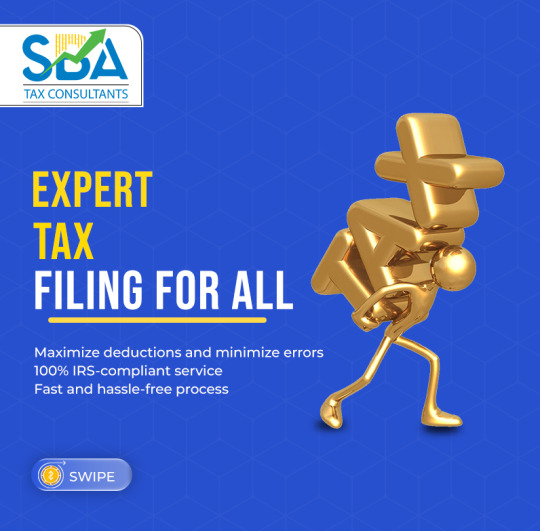
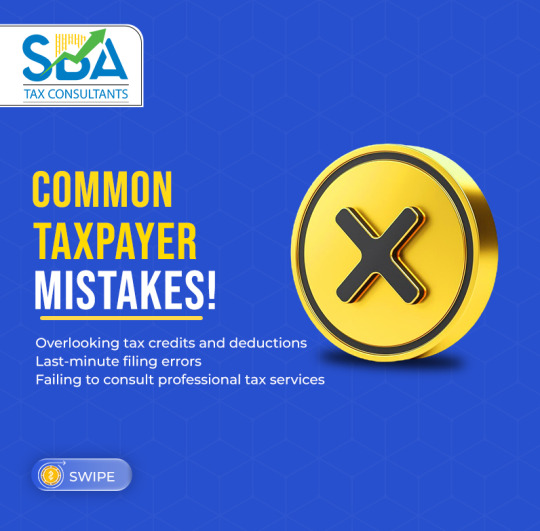
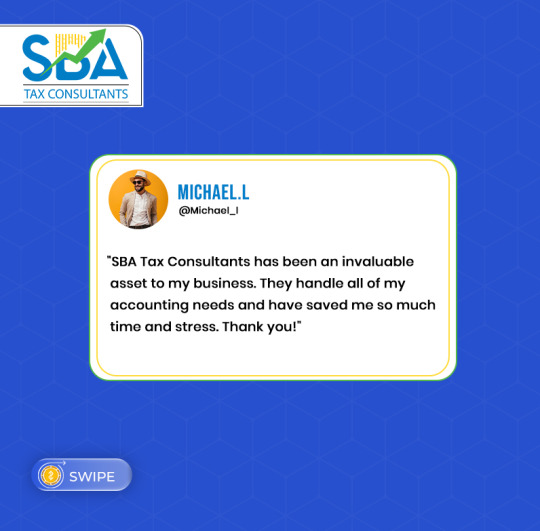

The October 15th Tax Filing Deadline is approaching fast! Don't miss the final opportunity to file your taxes. Our team at SBA Tax Consultants is here to help you avoid penalties and ensure you maximize your savings. Whether it's personal or business taxes, we've got you covered!
Visit us at: 8500 N Stemmons Fwy, Dallas, Texas 75247 Call: +1 469 722 5480 Email: [email protected] Learn more: sbataxconsultants.com
0 notes
Text
401K Assistance for Employee Benefits
In today’s dynamic employment landscape, offering competitive benefits is crucial for attracting and retaining top talent. Among these benefits, a 401(k) retirement plan stands out as a cornerstone of financial security for employees. However, navigating the intricate web of 401(k) tax laws can be daunting, even for seasoned professionals. At SBA Tax Consultants, we understand the importance of providing comprehensive guidance on 401(k) plans to ensure both employers and employees maximize their benefits while remaining compliant with IRS regulations. In this blog, we delve into the nuances of 401(k) tax laws, empowering SBA Tax Consultants and their clients to secure their financial futures effectively.

Understanding 401(k) Contributions:
One of the fundamental aspects of 401(k) plans is employee contributions. These contributions are typically made on a pre-tax basis, meaning they are deducted from employees’ paychecks before taxes are applied. This tax-deferred feature allows employees to lower their taxable income while simultaneously saving for retirement. It’s essential to educate both employers and employees about the contribution limits set by the IRS to ensure compliance and maximize tax benefits.
Employer Matching Contributions:
Many employers choose to enhance their 401(k) plans by offering matching contributions. These contributions, often subject to specific vesting schedules, serve as a valuable incentive for employees to participate in the plan. From a tax perspective, employer matching contributions are tax-deductible for businesses, providing a win-win scenario for both employers and employees. However, it’s crucial to adhere to IRS guidelines regarding contribution limits and nondiscrimination testing to maintain the plan’s qualified status.
Roth 401(k) Options:
In addition to traditional pre-tax contributions, many 401(k) plans offer Roth 401(k) options. Unlike traditional contributions, Roth contributions are made with after-tax dollars, meaning withdrawals during retirement are tax-free. This can be particularly advantageous for employees expecting to be in a higher tax bracket during retirement or seeking tax diversification in their retirement savings portfolio. Educating clients on the benefits and considerations of Roth 401(k) contributions can empower them to make informed decisions aligned with their financial goals.
Compliance and Reporting Obligations:
Navigating 401(k) tax laws goes beyond understanding contribution mechanisms; it also entails compliance with IRS reporting and disclosure requirements. From filing Form 5500 to conducting annual nondiscrimination testing, ensuring regulatory compliance is paramount for maintaining the plan’s qualified status and avoiding penalties. SBA Tax Consultants play a critical role in guiding their clients through these compliance obligations, offering expertise and support every step of the way.
Conclusion:
As SBA Tax Consultants, it’s imperative to stay abreast of the latest developments in 401(k) tax laws to provide clients with accurate and comprehensive guidance. By demystifying the complexities of 401(k) plans and offering tailored solutions, SBA Tax Consultants can empower employers and employees to make informed decisions that secure their financial futures. Together, we can unlock the power of 401(k) benefits and pave the way for a prosperous retirement journey.
0 notes
Text
Business Purchase Guide
Buying an existing business
can be a strategic move to leverage established operations, customer base, and reputation. However, it requires careful consideration and due diligence. Here's a general guide to help you through the process:
Define Your Goals: Why buy a business? Is it for passive income, growth potential, or a specific industry interest? Business Purchase What are your financial capabilities and risk tolerance?
Research the Market: Identify potential industries or niches. Explore online marketplaces (like BizBuySell) and local business brokers. Network with industry professionals.
Assess Potential Businesses: Evaluate financial performance: Review income statements, balance sheets, and cash flow statements. Assess customer base and market share. Analyze the business's competitive position. Consider the industry's trends and growth potential.
Conduct Due Diligence: Legal review: Examine contracts, leases, permits, and licenses. Financial audit: Verify financial information and identify potential liabilities. Operational assessment: Evaluate inventory, equipment, and supply chain. Customer and employee interviews: Gather insights into the business's culture and operations.
Negotiate the Purchase Price: Consider factors like assets, liabilities, earnings potential, and market conditions. Be prepared to negotiate and make counteroffers.
Secure Financing: Explore options like bank loans, SBA loans, or private investors. Prepare a detailed business plan to support your financing request.
Complete the Purchase: Finalize the purchase agreement, including terms, conditions, and closing date. Transfer ownership and assets. Obtain necessary permits and licenses.
Additional Considerations:Legal and tax implications: Consult with legal and tax professionals to understand the implications of business ownership. Contingency planning: Be prepared for potential challenges or unexpected issues during the transition. Post-acquisition integration: Develop a plan to integrate the acquired business into your existing operations.
1 note
·
View note
Text
Navigating Tax Laws: A Small Business Owner’s Survival Guide
1. Understand the Basics
a. Know Your Business Structure
Sole Proprietorship: Simplest form, but with unlimited personal liability.
Partnership: Shared responsibility and liability; taxes are passed through to partners.
LLC (Limited Liability Company): Offers liability protection with flexible tax options.
Corporation: Separate legal entity; taxed separately from owners, with more complex requirements.
b. Know Your Tax Obligations
Federal Income Taxes: Based on business structure and net income.
State Income Taxes: Varies by state; check local requirements.
Self-Employment Taxes: For sole proprietors, partners, and LLC members, includes Social Security and Medicare taxes.
Employment Taxes: Includes withholding for employee income taxes, Social Security, and Medicare.
2. Set Up Your Financial System
a. Keep Accurate Records
Income: Track all sources of income.
Expenses: Record all business-related expenses.
Receipts: Keep all receipts for verification.
b. Choose Accounting Software
QuickBooks: Popular for small businesses, with various features for tax tracking.
Xero: Known for its ease of use and mobile-friendly interface.
FreshBooks: Good for invoicing and expense tracking.
c. Hire a Professional
Accountant: Helps with tax planning and filing.
Tax Advisor: Provides guidance on tax strategy and compliance.
3. Learn About Deductions and Credits
a. Common Deductions
Office Supplies: Paper, pens, computers.
Utilities: Electricity, water, internet.
Rent: For office space or commercial property.
Travel: Business-related travel expenses.
Meals: 50% of business meals can be deducted.
b. Credits
Research and Development (R&D) Credit: For businesses investing in R&D.
Small Business Health Care Tax Credit: For businesses providing health insurance to employees.
4. Understand Tax Filing Requirements
a. Choose Your Filing Status
Quarterly Estimated Taxes: If you expect to owe $1,000 or more, you must pay estimated taxes quarterly.
Annual Returns: Based on your business structure, file Form 1040, 1120, 1120S, or 1065.
b. File and Pay on Time
Deadlines: Know the deadlines for quarterly estimated taxes and annual returns.
Extensions: File for an extension if needed, but remember this doesn’t extend the time to pay any taxes owed.
5. Stay Compliant with Tax Laws
a. Stay Updated
IRS Updates: Regularly check IRS updates or subscribe to newsletters.
State Tax Changes: Monitor changes in state tax laws that may affect your business.
b. Maintain Good Records
Retention Period: Keep records for at least 3-7 years, depending on the type of document and potential for audits.
c. Respond to Notices
IRS Notices: Address any correspondence from the IRS promptly to avoid penalties.
6. Plan for the Future
a. Tax Planning
Year-End Planning: Review your tax situation at year-end to make any necessary adjustments.
Retirement Plans: Consider setting up a retirement plan like a SEP IRA or Solo 401(k) to reduce taxable income.
b. Consult a Tax Professional
Regular Reviews: Schedule regular meetings with a tax professional to review your tax strategy and make adjustments as needed.
7. Use Tax Resources
a. IRS Resources
IRS Website: Offers forms, instructions, and guides.
Small Business and Self-Employed Tax Center: Provides resources specific to small businesses.
b. Online Tools
Tax Calculators: Estimate your tax liability with online calculators.
Deduction Finders: Identify potential deductions.
c. Professional Organizations
SCORE: Provides free mentoring and workshops for small business owners.
Small Business Administration (SBA): Offers resources and guides on various aspects of running a small business.
0 notes
Text
Navigating US Tax Compliance: A Guide for Business Owners

It was a chilly January morning in New York when Michael, the owner of a growing e-commerce business, sat down with a cup of coffee to tackle his annual tax preparations. The previous year had been a whirlwind of growth, and with it came a myriad of tax compliance challenges. As he sifted through piles of paperwork, Michael realized he needed a clearer understanding of US tax compliance to avoid costly mistakes. Determined to get it right this time, he began researching and consulting experts. Here is a guide inspired by Michael’s journey, aimed at helping business owners navigate the complexities of US tax compliance.
1. Understand Your Tax Obligations
The first step in navigating tax compliance is understanding your tax obligations. The US tax system requires businesses to pay various federal, state, and local taxes. According to the Small Business Administration (SBA), 90% of small businesses report taxes as a significant burden. Key federal taxes include income tax, self-employment tax, and employment taxes (such as Social Security and Medicare).
2. Register for an Employer Identification Number (EIN)
An Employer Identification Number (EIN) is essential for all businesses. The IRS uses this number to identify your business for tax purposes. As of 2022, the IRS reported that over 4.4 million new EINs were issued, reflecting the growing number of new businesses. Obtaining an EIN is a straightforward process and can be done online through the IRS website.
3. Keep Detailed Records
Maintaining accurate and detailed records is crucial for tax compliance. This includes keeping track of all income, expenses, and deductions. According to the IRS, inadequate record-keeping is one of the top reasons small businesses face audits. Using accounting software can streamline this process and ensure that your records are organized and up-to-date.
4. File and Pay Taxes on Time
Meeting tax deadlines is critical to avoid penalties and interest. The IRS reported that in 2021, approximately 5 million businesses were charged late filing penalties. Key deadlines for 2024 include:
January 15: Estimated quarterly tax payment for Q4 2023
March 15: S-Corporation and Partnership tax returns
April 15: Individual and C-Corporation tax returns
Filing and paying taxes on time demonstrates good business practice and keeps you in the IRS’s good graces.
5. Understand Employment Taxes
If you have employees, you are responsible for withholding and paying employment taxes, including federal income tax, Social Security, and Medicare taxes. The IRS requires businesses to report these taxes quarterly using Form 941. In 2023, the IRS collected over $1.3 trillion in employment taxes, highlighting the importance of compliance in this area.
6. Know Your State and Local Tax Obligations
In addition to federal taxes, businesses must comply with state and local tax laws. This can include state income tax, sales tax, and property tax. According to the Tax Foundation, the average combined state and local sales tax rate in the US is 7.12%. Each state has different requirements, so it’s essential to understand the specific obligations in your business’s location.
7. Take Advantage of Tax Deductions and Credits
Tax deductions and credits can significantly reduce your tax liability. Common deductions include office expenses, travel, and employee benefits. The IRS allows businesses to deduct up to $1.16 million in qualifying equipment purchases under Section 179 in 2024. Additionally, tax credits such as the Research and Development (R&D) Tax Credit can provide substantial savings. In 2022, businesses claimed approximately $18 billion in R&D tax credits.
8. Stay Informed About Tax Law Changes
Tax laws are constantly changing, and staying informed is crucial for compliance. For example, the Tax Cuts and Jobs Act of 2017 introduced significant changes, including the Qualified Business Income (QBI) deduction, which can reduce taxable income by up to 20% for eligible businesses. Regularly consulting with a tax professional can help you stay updated on relevant changes and ensure your business remains compliant.
9. Consider Professional Help
Navigating tax compliance can be challenging, and seeking professional help can be a wise investment. According to a survey by the National Small Business Association, 88% of small businesses use external tax professionals. These experts can provide valuable advice, ensure you take advantage of all available deductions and credits, and help you avoid costly mistakes.
10. Plan for the Future
Effective tax planning involves looking ahead and preparing for future tax obligations. This includes setting aside funds for taxes, planning major purchases strategically, and considering the tax implications of business decisions. Long-term tax planning can help you take advantage of new opportunities and ensure the financial health of your business.
Conclusion
As Michael reviewed his newfound knowledge, he felt more confident in his ability to navigate the complex world of US tax compliance. By understanding his tax obligations, keeping detailed records, and seeking professional advice, he knew he could avoid the pitfalls that had plagued him in the past. For business owners, leveraging effective business tax solutions is essential for maintaining compliance and focusing on what truly matters—growing and sustaining their businesses.
0 notes
Text
IRS Extends Tax Deadlines to November 1, 2024

In a move aimed at providing relief and flexibility to taxpayers, the Internal Revenue Service (IRS) has announced an extension of tax deadlines to November 1, 2024. This decision comes in response to various challenges faced by individuals and businesses, ensuring that everyone has ample time to fulfill their tax obligations without undue pressure.
Why the Extension?
Several factors have contributed to the IRS’s decision to extend the tax deadlines:
1. Economic Uncertainty: The ongoing economic fluctuations have made it difficult for many taxpayers to gather necessary documentation and complete their tax filings on time.
2. Natural Disasters: Recent natural disasters have disrupted lives and businesses, making it harder for affected individuals to meet the original deadlines.
3. Administrative Backlogs: The IRS has faced its own set of challenges, including staffing shortages and processing backlogs, which have delayed the handling of tax returns and inquiries.
Key Dates to Remember
With the new deadline of November 1, 2024, taxpayers should take note of the following important dates:
Estimated Tax Payments: For those making quarterly estimated tax payments, the new deadlines apply to any payments due from now until November 1.
Extension Filings: If you had filed for an extension, the original October 15 deadline is now extended to November 1.
Penalty Relief: The IRS has indicated that penalties for late filing and late payment will be waived for returns and payments made by the new deadline.
How to Take Advantage of the Extension
Here are some steps to ensure you make the most of this extended period:
1. Review Your Tax Documents: Use this additional time to thoroughly review and organize your tax documents. Make sure you have all necessary receipts, W2s, 1099s, and other relevant forms.
2. Consult a Tax Professional: If you haven’t already, consider seeking advice from a tax professional. They can provide guidance on how to maximize deductions and credits, ensuring you pay only what you owe.
3. Stay Informed: Keep an eye on IRS updates and announcements. The IRS website is a valuable resource for the latest information on tax deadlines and other important notices.
Potential Benefits of the Extension
The extended deadline offers several potential benefits:
Financial Planning: More time allows for better financial planning and cash flow management, particularly for businesses and individuals who may be facing financial constraints.
Accurate Filings: With extra time, taxpayers can ensure their filings are accurate, reducing the risk of errors and potential audits.
Stress Reduction: The extension helps alleviate the stress and anxiety often associated with tax season, giving taxpayers a breather to manage their other responsibilities.
The IRS’s decision to extend tax deadlines to November 1, 2024, provides a much needed reprieve for taxpayers nationwide. Whether you’re an individual filer or a business owner, take advantage of this extension to carefully prepare your tax documents, seek professional advice, and ensure you meet your obligations without the added pressure of a tight deadline.
For more information and updates, visit the SBA Tax Consultants.
Corporation Registrations, IRS, Payroll, Tax Advisors, Tax Consultants, Tax Filing, Tax Services
0 notes

